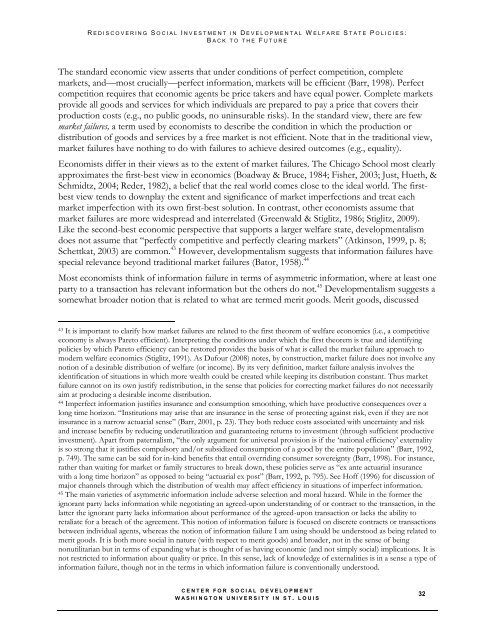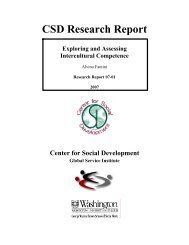Rediscovering social investment in developmental welfare state ...
Rediscovering social investment in developmental welfare state ...
Rediscovering social investment in developmental welfare state ...
You also want an ePaper? Increase the reach of your titles
YUMPU automatically turns print PDFs into web optimized ePapers that Google loves.
R E D I S C O V E R I N G S O C I A L I N V E S T M E N T I N D E V E L O P M E N T A L W E L F A R E S T A T E P O L I C I E S :<br />
B A C K T O T H E F U T U R E<br />
The standard economic view asserts that under conditions of perfect competition, complete<br />
markets, and—most crucially—perfect <strong>in</strong>formation, markets will be efficient (Barr, 1998). Perfect<br />
competition requires that economic agents be price takers and have equal power. Complete markets<br />
provide all goods and services for which <strong>in</strong>dividuals are prepared to pay a price that covers their<br />
production costs (e.g., no public goods, no un<strong>in</strong>surable risks). In the standard view, there are few<br />
market failures, a term used by economists to describe the condition <strong>in</strong> which the production or<br />
distribution of goods and services by a free market is not efficient. Note that <strong>in</strong> the traditional view,<br />
market failures have noth<strong>in</strong>g to do with failures to achieve desired outcomes (e.g., equality).<br />
Economists differ <strong>in</strong> their views as to the extent of market failures. The Chicago School most clearly<br />
approximates the first-best view <strong>in</strong> economics (Boadway & Bruce, 1984; Fisher, 2003; Just, Hueth, &<br />
Schmidtz, 2004; Reder, 1982), a belief that the real world comes close to the ideal world. The firstbest<br />
view tends to downplay the extent and significance of market imperfections and treat each<br />
market imperfection with its own first-best solution. In contrast, other economists assume that<br />
market failures are more widespread and <strong>in</strong>terrelated (Greenwald & Stiglitz, 1986; Stiglitz, 2009).<br />
Like the second-best economic perspective that supports a larger <strong>welfare</strong> <strong>state</strong>, <strong>developmental</strong>ism<br />
does not assume that ―perfectly competitive and perfectly clear<strong>in</strong>g markets‖ (Atk<strong>in</strong>son, 1999, p. 8;<br />
Schettkat, 2003) are common. 43 However, <strong>developmental</strong>ism suggests that <strong>in</strong>formation failures have<br />
special relevance beyond traditional market failures (Bator, 1958). 44<br />
Most economists th<strong>in</strong>k of <strong>in</strong>formation failure <strong>in</strong> terms of asymmetric <strong>in</strong>formation, where at least one<br />
party to a transaction has relevant <strong>in</strong>formation but the others do not. 45 Developmentalism suggests a<br />
somewhat broader notion that is related to what are termed merit goods. Merit goods, discussed<br />
43 It is important to clarify how market failures are related to the first theorem of <strong>welfare</strong> economics (i.e., a competitive<br />
economy is always Pareto efficient). Interpret<strong>in</strong>g the conditions under which the first theorem is true and identify<strong>in</strong>g<br />
policies by which Pareto efficiency can be restored provides the basis of what is called the market failure approach to<br />
modern <strong>welfare</strong> economics (Stiglitz, 1991). As Dufour (2008) notes, by construction, market failure does not <strong>in</strong>volve any<br />
notion of a desirable distribution of <strong>welfare</strong> (or <strong>in</strong>come). By its very def<strong>in</strong>ition, market failure analysis <strong>in</strong>volves the<br />
identification of situations <strong>in</strong> which more wealth could be created while keep<strong>in</strong>g its distribution constant. Thus market<br />
failure cannot on its own justify redistribution, <strong>in</strong> the sense that policies for correct<strong>in</strong>g market failures do not necessarily<br />
aim at produc<strong>in</strong>g a desirable <strong>in</strong>come distribution.<br />
44 Imperfect <strong>in</strong>formation justifies <strong>in</strong>surance and consumption smooth<strong>in</strong>g, which have productive consequences over a<br />
long time horizon. ―Institutions may arise that are <strong>in</strong>surance <strong>in</strong> the sense of protect<strong>in</strong>g aga<strong>in</strong>st risk, even if they are not<br />
<strong>in</strong>surance <strong>in</strong> a narrow actuarial sense‖ (Barr, 2001, p. 23). They both reduce costs associated with uncerta<strong>in</strong>ty and risk<br />
and <strong>in</strong>crease benefits by reduc<strong>in</strong>g underutilization and guarantee<strong>in</strong>g returns to <strong><strong>in</strong>vestment</strong> (through sufficient productive<br />
<strong><strong>in</strong>vestment</strong>). Apart from paternalism, ―the only argument for universal provision is if the ‗national efficiency‘ externality<br />
is so strong that it justifies compulsory and/or subsidized consumption of a good by the entire population‖ (Barr, 1992,<br />
p. 749). The same can be said for <strong>in</strong>-k<strong>in</strong>d benefits that entail overrid<strong>in</strong>g consumer sovereignty (Barr, 1998). For <strong>in</strong>stance,<br />
rather than wait<strong>in</strong>g for market or family structures to break down, these policies serve as ―ex ante actuarial <strong>in</strong>surance<br />
with a long time horizon‖ as opposed to be<strong>in</strong>g ―actuarial ex post‖ (Barr, 1992, p. 795). See Hoff (1996) for discussion of<br />
major channels through which the distribution of wealth may affect efficiency <strong>in</strong> situations of imperfect <strong>in</strong>formation.<br />
45 The ma<strong>in</strong> varieties of asymmetric <strong>in</strong>formation <strong>in</strong>clude adverse selection and moral hazard. While <strong>in</strong> the former the<br />
ignorant party lacks <strong>in</strong>formation while negotiat<strong>in</strong>g an agreed-upon understand<strong>in</strong>g of or contract to the transaction, <strong>in</strong> the<br />
latter the ignorant party lacks <strong>in</strong>formation about performance of the agreed-upon transaction or lacks the ability to<br />
retaliate for a breach of the agreement. This notion of <strong>in</strong>formation failure is focused on discrete contracts or transactions<br />
between <strong>in</strong>dividual agents, whereas the notion of <strong>in</strong>formation failure I am us<strong>in</strong>g should be understood as be<strong>in</strong>g related to<br />
merit goods. It is both more <strong>social</strong> <strong>in</strong> nature (with respect to merit goods) and broader, not <strong>in</strong> the sense of be<strong>in</strong>g<br />
nonutilitarian but <strong>in</strong> terms of expand<strong>in</strong>g what is thought of as hav<strong>in</strong>g economic (and not simply <strong>social</strong>) implications. It is<br />
not restricted to <strong>in</strong>formation about quality or price. In this sense, lack of knowledge of externalities is <strong>in</strong> a sense a type of<br />
<strong>in</strong>formation failure, though not <strong>in</strong> the terms <strong>in</strong> which <strong>in</strong>formation failure is conventionally understood.<br />
C E N T E R F O R S O C I A L D E V E L O P M E N T<br />
W A S H I N G T O N U N I V E R S I T Y I N S T . L O U I S<br />
32
















